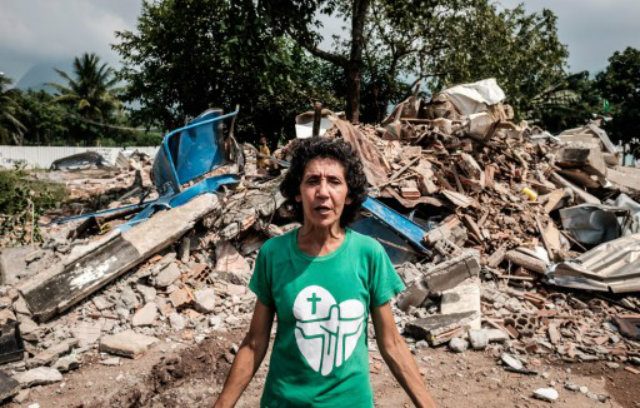SUMMARY
This is AI generated summarization, which may have errors. For context, always refer to the full article.

RIO DE JANEIRO, Brazil – If the world’s strongest and fastest athletes in Rio’s Olympic Park want to see a real champion they should look across the fence for Maria da Penha Macena.
Penha, 51, may not have sporting muscles, but she’s proved her strength in taking on Rio’s powerful mayor and the Olympic construction machine in refusing to leave the place she calls home.
The area, called Vila Autodromo, was a working class favela where Penha had lived 23 years before the authorities said the whole neighborhood had to be torn down to make way for the Olympic Park.
After long resistance, nearly everyone agreed, in many cases swapping their homes for generous financial compensation or a place in a newly built housing complex. But Penha and a handful of others stayed on, standing their ground as the streets around them were razed.
Against all odds they won: Penha’s original house was knocked down but the government agreed to build her a new dwelling nearby.
“I am happy because what I wanted above all was to stay in this community and we were victorious,” Penha, a cleaning lady, says.
However the long drama came at huge cost.
“Out of the 600 families that used to be here there are only 20 now,” she said amid noise and dust from construction on her house.
Thorn in mayor’s side
Mayor Eduardo Paes is used to getting his own way when it comes to staging the Olympics, which start August 5.
And starting in 2013 he saw the Vila Autodromo, a laid back and largely unregulated community, as an eyesore in the way of the Olympic Park and his glitzier vision of Rio de Janeiro.
Eviction orders were issued, backed by compensation packages, and immediately resistance started, dividing neighbors as they debated over whether to accept.
Penha turned into a leader of the stay camp, literally fighting for her right to remain: her nose was broken during violent scuffles with city security forces at one protest.
Vocal and a frequent presence in the international media, she became a constant thorn in Paes’ side. At one point she was being offered the equivalent of $614,000 to leave – a huge fortune for most Brazilians – but still refused.
“I believe in the right not to sell. Happiness, rights and respect, they have no price,” she said.
On March 8 this year, a construction crew flattened her house, breaking her heart. “It was as if they were gradually destroying the history of my life,” she said.
The house gone, Penha was forced to move in with relatives.
But while she looked defeated, she had her supporters: that same day, the local legislature recognized her in honor of International Women’s Day.
And Penha was still not giving up.
“They can knock down my house, but not me,” she told journalists at the time.
New life
Amazingly, her patience was awarded.
In April, City Hall accepted a new development plan for the area which would include housing for 20 families, including Penha’s.
Construction is underway and expected to end soon. Penha, true to form, is staying on site in a container so that she can supervise the work.
Her new house will have two bedrooms, a bathroom and a garden. The mayor’s office is also promising that schools will be built to serve the surrounding area, bringing new life.
Unlike in the old favela there’ll be proper streets and sanitation.
For the majority of families who accepted new housing in the Carioca Park complex, things have also worked out in the end, even if some are unhappy with what they say is poor construction.
But Penha, who has talked about her struggle before the UN’s rights body and the International Olympic Committee in Geneva, says the Olympics transformation will always leave a bitter aftertaste.
“Where is the legacy for ordinary people?” she asked. “They destroyed my community.” – Rappler.com
Add a comment
How does this make you feel?
There are no comments yet. Add your comment to start the conversation.